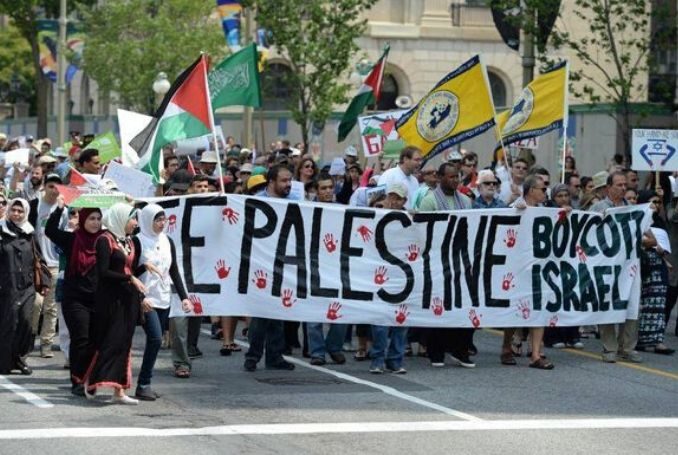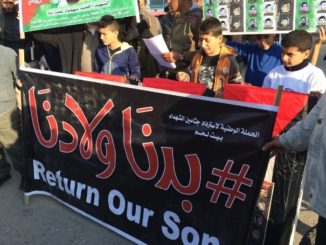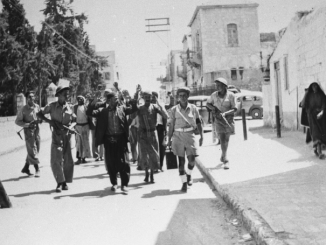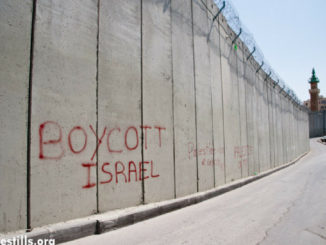
By Benay Blend
When they are met by Palestinians and their supporters who speak their own language of liberation, Zionists revert to long-held tactics of divide and conquer.
In December 2021, Palestine Chronicle editor and writer Ramzy Baroud delivered a lecture at the Universidad Complutense, Department of International Relations.
Presented in conjunction with Palestinian solidarity week in Madrid, his criticism of the Western notion that there are two varieties of Palestinians, the “moderates,” who should always be promoted, and the “radicals,” who all activists, whether Palestinians or their supporters, must distance themselves from lest they undergo guilt by mere association.
On Turtle Island, this kind of favoritism is not new. It goes back to the founding of the country on the backs of enslaved people who were divided into “good” and “bad,” depending on the overtness of their resistance. The enslaved who outwardly accepted their position were enshrined as “loyal slaves” in popular culture; on the other hand, others, like the preacher Nat Turner, who recruited 70 enslaved people to murder at least 55 men, women, and children in hope of inciting a larger rebellion, went down in infamy.
It was Abraham Lincoln who freed the slaves, not Nat Turner. It was a war, not a rebellion, that ended slavery, because if a revolt, claimed the late historian Howard Zinn, it might go too far, and thus turn attention onto “the most successful system of capitalist enrichment in the world. If a war, those who made the war would organize its consequences” (A People’s History of the United States, 2003, [original work published 1980], p. 171).
This mentality continues to impact who controls the rules. In “The Role of Black Misleadership Today,” Tamar Wilson explains that the capitalist elite today must solve the problem of “how to give the appearance of anti-racist progress” to the working poor, without really changing anything at all. In reality, the establishment has overseen the rise of several Black mayors, who, rather than target “police brutality and systemic violence,” insist that the way to overcome systemic problems is through “respectability and expansion of the Black middle class,” not by going to the core of the problem which has been embedded in this country’s institutions since its founding.
In their recently released The Red Deal: Indigenous Action to Save Our Earth (2021), The Red Nation (TRN) collective explains that politicians use the term “reform” as an equivalent to social change by asking the elite to implement harm reduction that might gradually filter down. This approach, they conclude, “attempts to treat the symptoms of a crisis, rather than the structures of power that create crisis in the first place” (p. 36).
In each of these examples, there is a common trope: rules are made by those above, designed to ensure that nothing gets out of hand. Unruly segments are kept at a distance, neutralized whenever possible by shaming, stigmatizing, or, when all else fails, state-sponsored assassination.
The same trajectory can be applied to Palestine solidarity groups, many of whom, writes Ramzy Baroud, focus on challenging the Zionist narrative that sees Palestinian resistors as “terrorists,” “militants,” and so on, including even those who use such non-violent tactics as hunger strikes (which are, of course, violent as regards to damage done to the striker’s health and body.) The result, Baroud continues, is that Zionists have preempted the script by determining what is admissible when framing the resultant dialogue.
These activists, perhaps unwittingly, fall into the framework, outlined above, that has plagued the mainstream civil rights movement: regarding the rules of discourse, what must be shied away from, and what can be said and not said, are written almost entirely by the opposition, in this case, Zionists who continue to control the text.
When they are met by Palestinians and their supporters who speak their own language of liberation, Zionists revert to long-held tactics of divide and conquer, in this case dividing the solidarity movement into “good activists,” who privilege non-violent resistance, and “bad activists,” those who support all forms of resistance deemed necessary by Palestinians for their victory.
For example, Samidoun: Palestinian Prisoner Solidarity Network has repeatedly been the target of smear campaigns, the latest in Berlin where for the second year in a row police have banned public commemoration of the Nakba. In response, Samidoun declared that “the labeling of legitimate Palestinian anger and commitment as a threat to public safety” constitutes an “abhorrent act of censorship,” a measure that also seeks to prevent solidarity with other struggles.
In that vein, the Zionist news service recently reached as far as Albuquerque, New Mexico to target our local chapter of Samidoun. On May 15, the Southwest Coalition for Palestine, along with Jewish Voice for Peace-Albuquerque and Santa Feans for Justice in Palestine, hosted a showing of the Aljazeera film Al-Nakba: The Palestinian Catastrophe at Congregation Nahalat Shalom.
Almost immediately, a headline appeared in the Jerusalem Post declaring that a New Mexico congregation agreed to screen a Palestinian “terror-funded” film. Although Samidoun-ABQ merely endorsed the event in a spirit of collegiality, in the eyes of the Post it became the leading actor, again most likely to inhibit solidarity with the other groups. “A group of anti-Israel and anti-American organizations, including the Israeli-designated terror group Samidoun,” were the masterminds, according to the article, an example of the kind of fear-mongering meant to intimidate those who refuse to bend.
Similarly, in Berlin resistance met repression as Palestinian, Arab, and internationalist youth defied a government ban by marching through Sonnanallee, one of the main streets of Berlin’s Arab community, in a demonstration “commemorating 75 years of ongoing Nakba and 75 years of Palestinian resistance and defying German state repression.”
This action, writes Samidoun, delivers the following message:
“that repression will never suppress the Palestinian voice or the Palestinian cause, on the Palestinian, Arab and international level, and can only spark greater unity against imperialism and Zionism. Such repression is being met with greater unity among all who are facing the boot of the German state, and ongoing resistance, in the spirit of the Palestinian resistance that has continued and is continuing despite 75 years of Nakba and colonialism.”
In this spirit of this unified resistance, Baroud’s words that opened this article conclude with a call for a “third narrative,” one that meshes with “a rising consciousness around the world over challenging old ideas and narratives” and emphasizes “intersectionality” among the colonized people of the world.
In “New Rules of Engagement,” Baroud offers a roadmap to challenge those who previously controlled the rules. “Palestinian Resistance has managed to challenge, if not to reverse, the rules of engagements like never before,” he concludes, a formula that the solidarity movement might follow in order to reverse who heretofore controlled the script.

– Benay Blend earned her doctorate in American Studies from the University of New Mexico. Her scholarly works include Douglas Vakoch and Sam Mickey, Eds. (2017), “’Neither Homeland Nor Exile are Words’: ‘Situated Knowledge’ in the Works of Palestinian and Native American Writers”. She contributed this article to The Palestine Chronicle.







